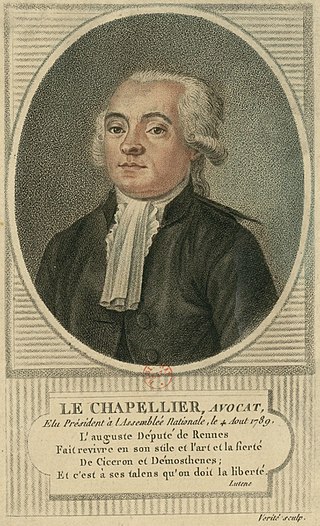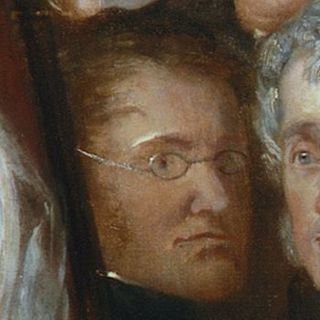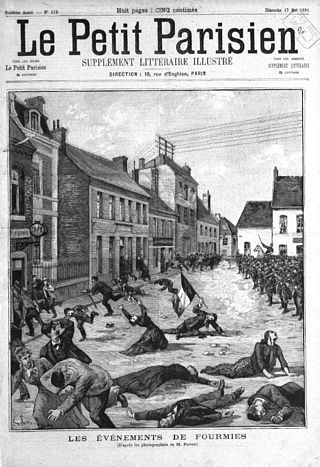Related Research Articles

The president of France, officially the president of the French Republic, is the executive head of state of France, and the commander-in-chief of the French Armed Forces. As the presidency is the supreme magistracy of the country, the position is the highest office in France. The powers, functions and duties of prior presidential offices, in addition to their relation with the prime minister and government of France, have over time differed with the various constitutional documents since the Second Republic.

The National Assembly is the lower house of the bicameral French Parliament under the Fifth Republic, the upper house being the Senate. The National Assembly's legislators are known as députés, meaning "delegate" or "envoy" in English; etymologically, it is a cognate of the English word deputy, the standard term for legislators in many parliamentary systems.

Isaac René Guy Le Chapelier was a French jurist and politician of the Revolutionary period.

Louis Gabriel Ambroise, Vicomte de Bonald was a French counter-revolutionary philosopher and politician. He is mainly remembered for developing a theoretical framework from which French sociology would emerge.

Louis Marie de La Révellière-Lépeaux was a deputy to the National Convention during the French Revolution. He later served as a prominent leader of the French Directory.

The Constitution of the Year VIII was a national constitution of France, adopted on 24 December 1799, which established the form of government known as the Consulate. The coup of 18 Brumaire had effectively given all power to Napoleon Bonaparte, and in the eyes of some, ended the French Revolution.

The Constitutional Council is the highest constitutional authority in France. It was established by the Constitution of the Fifth Republic on 4 October 1958 to ensure that constitutional principles and rules are upheld. It is housed in the Palais-Royal in Paris. Its main activity is to rule on whether proposed statutes conform with the Constitution, after they have been voted by Parliament and before they are signed into law by the President of the Republic, or passed by the government as a decree, which has law status in many domains, a right granted to the government under delegation of Parliament.

Alfred Joseph Naquet, was a French chemist and politician.
The droit d'auteur or French authors' rights law, is in the jurisdiction of France a set of exclusive prerogatives available to a creator over his or her intellectual work, as part of the intellectual property area of law. It has been very influential in the development of authors' rights laws in other civil law jurisdictions, and in the development of international authors' rights law such as the Berne Convention. It has its roots in the 16th century, before the legal concept of copyright was developed in the United Kingdom. Based on the "rights of the author" instead of on the right to copy, its philosophy and terminology are different from those used in copyright law in common law jurisdictions. The term droit d’auteur reveals that the interests of the author are at the center of the system, not that of the investor.

François-André Isambert was a French lawyer, historian, and politician. Isambert was founder and for an extended period contributor of the Gazette des Tribunaux and actively participated in Louis François Wolowski's Revue de législation et de jurisprudence.
The Gayssot Act or Gayssot Law, enacted on 13 July 1990, makes it an offence in France to question the existence or size of the category of crimes against humanity as defined in the London Charter of 1945, on the basis of which Nazi leaders were convicted by the International Military Tribunal at Nuremberg in 1945–1946.

Olivier Émile Ollivier was a French statesman. Starting as an avid republican opposed to Emperor Napoleon III, he pushed the Emperor toward liberal reforms and in turn came increasingly into Napoleon's grip. He entered the cabinet and was the prime minister when Napoleon fell.
French labour law is the system of labour law operating in France.

The politics of France take place within the framework of a semi-presidential system determined by the French Constitution of the French Fifth Republic. The nation declares itself to be an "indivisible, secular, democratic, and social Republic". The constitution provides for a separation of powers and proclaims France's "attachment to the Rights of Man and the principles of National Sovereignty as defined by the Declaration of 1789".

The French constitution of 4 October 1958 was revised many times in its early years. Changes to this fundamental law have become more frequent since the 1990s, for two major reasons:
- public projects for institutional modernization
- adaptation to European Union and other international law.
Events from the year 1791 in France.

The loi pour une République numérique is a French law first proposed by Axelle Lemaire, Secretary of State for Digital Affairs, voted on 7 October 2016.

The Fusillade de Fourmies was an event which happened on 1 May 1891 in Fourmies, in the French Nord department. Government troops fired on a peaceful demonstration of workers claiming "C'est les huit heures qu'il nous faut !", killing nine people and injuring 35 others.
The Ollivier law was a French law, voted in 25 May 1864, which legalized the right to strike which was not allowed in France since 1791. However it remained limited and still maintained the concept of "impeding the free exercise of employees rights".

The Constitution of the French Republic of 27 October 1946 was the constitution of the French Fourth Republic.
References
- ↑ Thillay, Alain (2002). Le Faubourg Saint-Antoine et ses faux ouvriers: la liberté du travail à Paris aux XVIIe et XVIIIe siècles (Thesis). Seyssel: Champ Vallon. ISBN 2876733382.